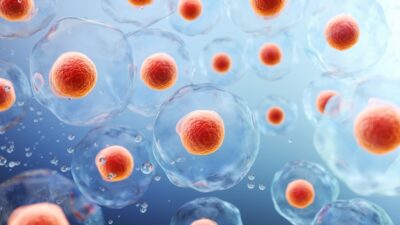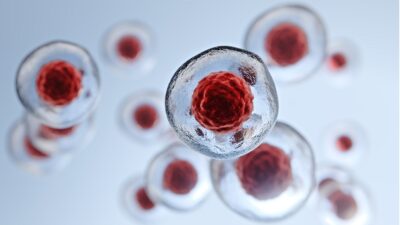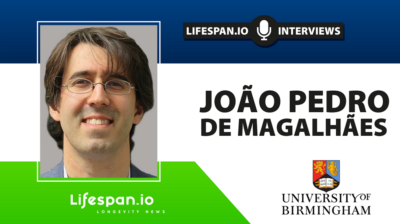Rejuvenation Roundup August 2025
- Finding out what's helpful and what's harmful is always the challenge.

Over the last month, researchers have discovered how well-known substances can confer physical benefits, delivered compounds into the bloodstream in new ways, and continued to develop new forms of medicine. Here’s what’s happened in August.
Team and activities
 Lifespan Alliance Launch & New Leadership at LRI: We have announced the launch of the Lifespan Alliance, a sponsorship initiative uniting mission-driven companies and visionary organizations dedicated to extending healthy human lifespan.
Lifespan Alliance Launch & New Leadership at LRI: We have announced the launch of the Lifespan Alliance, a sponsorship initiative uniting mission-driven companies and visionary organizations dedicated to extending healthy human lifespan.
Interviews
Nir Barzilai: “Positive Evidence for Metformin is Mounting”: Dr. Nir Barzilai, the director of the Institute for Aging Research at the Albert Einstein College of Medicine, among his many other titles, is one of geroscience’s most prominent figures.
Research Roundup
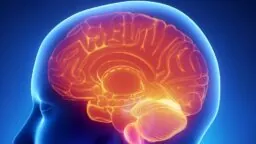 Study Finds Metformin’s Action Is Regulated by the Brain: A new study has shown that, unlike many other glucose-lowering drugs, metformin is regulated by the protein Ras1 in a specific subset of neurons, and when injected into the brain, even tiny doses of metformin can do the job.
Study Finds Metformin’s Action Is Regulated by the Brain: A new study has shown that, unlike many other glucose-lowering drugs, metformin is regulated by the protein Ras1 in a specific subset of neurons, and when injected into the brain, even tiny doses of metformin can do the job.
A Brain Clock for Finding Rejuvenating Medications: Researchers have developed a transcription-based clock that estimates brain age and used it to identify potential interventions against age-related neurodegeneration.
 Study Paves Road for Oral Delivery of Proteins: Using a pathogen-originated protein and a human antibody, scientists have created a chimeric construct that can deliver protein cargo via the intestine.
Study Paves Road for Oral Delivery of Proteins: Using a pathogen-originated protein and a human antibody, scientists have created a chimeric construct that can deliver protein cargo via the intestine.
Nicotine Consumption Improves Motor Functions in Male Mice: A recent study reported that long-term nicotine consumption had a positive impact on motor function in male mice. The beneficial effects were mediated by sphingolipid and NAD+ metabolism.
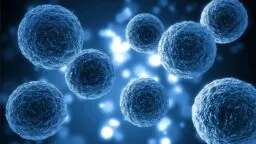 A Better Extracellular Matrix Makes Aged Cells Act Youthful: Researchers have found that growing older cells in a youthful medium causes them to behave and function more like younger cells, suggesting a new method of creating stem cell-based therapies.
A Better Extracellular Matrix Makes Aged Cells Act Youthful: Researchers have found that growing older cells in a youthful medium causes them to behave and function more like younger cells, suggesting a new method of creating stem cell-based therapies.
Mitochondria Transplant Improves Chemotherapy in Lung Cancer: Scientists have demonstrated that injecting healthy mitochondria either systematically or directly into the tumor microenvironment boosts the efficiency of a standard anti-cancer therapy.
 How FGF21 Fights Back Against a Muscle-Wasting Disease: In Aging, researchers have reported on how an increase in FGF21, a myokine that encourages muscle growth, impacts the progression of amyotrophic lateral sclerosis.
How FGF21 Fights Back Against a Muscle-Wasting Disease: In Aging, researchers have reported on how an increase in FGF21, a myokine that encourages muscle growth, impacts the progression of amyotrophic lateral sclerosis.
Cannabis as a Treatment for Age-Related Diseases: Researchers have recently published a review on how cannabis use among older adults impacts age-related conditions and longevity.
 How Inflammation Is Linked to Heart Disease: In Cell Reports Medicine, researchers have published a detailed review on the relationship between cardiovascular disease and the age-related inflammation known as inflammaging.
How Inflammation Is Linked to Heart Disease: In Cell Reports Medicine, researchers have published a detailed review on the relationship between cardiovascular disease and the age-related inflammation known as inflammaging.
Moving to a More Walkable City Increases Step Count: Working with data from a smartphone app, scientists have shown for the first time that relocating to a more walkable city is linked to increased daily step counts.
 Exosomes Reduce Sarcopenia in a Mouse Model: Researchers have discovered that exosomes secreted by mesenchymal stem cells derived from human umbilical cord tissue (hucMSC-Exos) restore muscle function in a mouse model of sarcopenia.
Exosomes Reduce Sarcopenia in a Mouse Model: Researchers have discovered that exosomes secreted by mesenchymal stem cells derived from human umbilical cord tissue (hucMSC-Exos) restore muscle function in a mouse model of sarcopenia.
An Overly Youthful Immune System Might Cause Autoimmunity: Scientists have proposed a hypothesis that immune aging might be necessary to shield people from autoimmune effects, as the repertoire of autoantigens expands with age.
 Low-Dose Lithium Reverses Features of Alzheimer’s in Mice: In a recent study, researchers identified the critical role that lithium plays in brain health and the development of mild cognitive impairment and Alzheimer’s disease.
Low-Dose Lithium Reverses Features of Alzheimer’s in Mice: In a recent study, researchers identified the critical role that lithium plays in brain health and the development of mild cognitive impairment and Alzheimer’s disease.
Researchers Identify a Key Senescence-Spreading Factor: In Metabolism Clinical & Experimental, researchers have described how the reduced isoform of the SASP factor HMGB1 causes senescence to spread.
 Transient Epigenetic Rejuvenation Recorded in Athletes: A new study has found that professional soccer players experience a drop in their biological age after a match, as measured by biomarkers assessed with state-of-the-art methylation clocks. We asked Dr. Steve Horvath, the study’s co-author, to comment.
Transient Epigenetic Rejuvenation Recorded in Athletes: A new study has found that professional soccer players experience a drop in their biological age after a match, as measured by biomarkers assessed with state-of-the-art methylation clocks. We asked Dr. Steve Horvath, the study’s co-author, to comment.
Reducing an Iron-Associated Protein Fights Cognitive Decline: In Nature Aging, researchers have described how an increase in the iron-associated protein ferritin light chain 1 (FTL1) is related to age-related cognitive impairment.
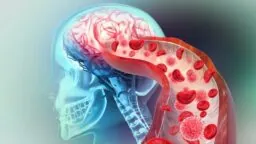 Impaired Brain Blood Flow Might Be Important in Alzheimer’s: Scientists have developed a potent diagnostic tool based on the vascular hypothesis for Alzheimer’s. It outperformed three current techniques and might offer clues to the mechanism behind the disease.
Impaired Brain Blood Flow Might Be Important in Alzheimer’s: Scientists have developed a potent diagnostic tool based on the vascular hypothesis for Alzheimer’s. It outperformed three current techniques and might offer clues to the mechanism behind the disease.
Rejuvenating Atherosclerotic Foam Cells: According to a study published by Cyclarity Therapeutics, its drug UDP-003 shows benefits in reversing the root cause of atherosclerotic plaques.
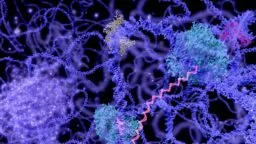 Loose Chromatin, Senescent Inflammation, and Cancer: In Aging Cell, researchers have reported that chromatin demethylation allows SASP compounds to be more easily expressed.
Loose Chromatin, Senescent Inflammation, and Cancer: In Aging Cell, researchers have reported that chromatin demethylation allows SASP compounds to be more easily expressed.
Moderate Beer Consumption Produces Benefits in Mice: Scientists have given three types of beer to artificially aged male mice and recorded numerous beneficial effects, including improvements in microbiome diversity and lipid profiles.
Effects of fasting-mimicking diets with low and high protein content on cardiometabolic health and autophagy: A randomized, parallel group study: Both diets promoted cardiometabolic health and induction of autophagy, with the high-protein diet selectively conferring novel benefits in body composition, circulating lipid profiles, heart rate variability and gut microbiome health.
Lower diet quality accelerates DNA methylation-based age: These findings demonstrate the independent contribution of diet quality to healthy aging-related epigenetic mechanisms.
Effects of resistance-based training and polyphenol supplementation on physical function, metabolism, and inflammation in aging individuals: These results indicate that a combined RT and minimal HIIT program improves muscular, aerobic, and metabolic health, and may improve inflammatory regulation in aging adults.
Curcumin Induces Transgenerational and Sex-Specific Effects on Lifespan, Gene Expression, and Metabolism in the Fruit Fly Drosophila melanogaster: These results show that curcumin’s beneficial effects in the parental generation are followed by deleterious effects in the offspring.
Association of 25(OH)D serum level with biological aging: A Cross-Sectional Study of 2007–2016 NHANES surveys: These findings indicate that vitamin D insufficiency has an inverse link with accelerated biological aging, and high levels of vitamin D in males accelerated biological aging as well.
The novel effects of the cardiovascular drug ranolazine on the alleviation of age-related cognitive decline and the underlying mechanisms: This study reveals ranolazine’s previously unrecognized role in alleviating age-related cognitive decline for the first time.
What is the clinical evidence to support off-label rapamycin therapy in healthy adults?: Despite the preclinical evidence supporting the use of sirolimus to enhance mean and maximal lifespan, the data in humans have yet to establish that rapamycin, or its analogues, is a proven seno-therapeutic that can delay aging in healthy older adults.
The association between lutein and zeaxanthin intake and multi-level biological aging: These findings highlight lutein’s translatable potential for aging interventions and provide insights for dietary strategies in aging health management.
Statin Treatment for Reducing Mortality Risk in Individuals over 75 Years of Age: A Large-Scale Retrospective Analysis: Provision of statin therapy contributes to a reduction in risk of all-cause mortality in individuals aged 75 years and above who have an unknown history of cardiovascular disease, regardless of the type of statin or the patient’s CCI score.
No winners or losers: clinical chemistry-based biological aging metrics perform similarly across cohorts and health outcomes: Effect sizes are heterogeneous across cohorts, highlighting the importance of replicating findings in different contexts and with different metrics.
From clock to clock: Therapeutic target discovery for aging and age-related diseases: Building on recently published aging clocks, the researchers re-establish a significant proportion of known drug targets by identifying clock-associated genes, highlighting the potential of these clocks for target identification
A unifying theory of aging and mortality: This paper is the first to offer a full mathematical explanation of Gompertz’s law and its limitations based on network theory.
Identifying the optimal combinations of modifiable dementia risk factors to target in multidomain intervention: Identifying risk factor combinations with the highest prevalence and largest effect sizes can enhance efficiency of trial design.
Network Pharmacology and Machine Learning Identify Flavonoids as Potential Senotherapeutics: These researchers’ results enabled them to identify 714 compounds with potential senescent therapeutic activity, of which 270 exhibited desirable medicinal chemistry properties, and they developed an interactive web tool freely accessible to the scientific community.
Prevalent mesenchymal drift in aging and disease is reversed by partial reprogramming: These findings provide mechanistic insight into the underlying beneficial effects of partial reprogramming and offer a framework for developing interventions to reverse age-related diseases using the partial reprogramming approach.
Translational fidelity and longevity are genetically linked: These results support the impact of translational fidelity on intra-specific longevity variation.
News Nuggets
 Augmentation Lab Announces the Human Augmentation Summit: On August 23, the 2025 Human Augmentation Summit was a gathering of creators – from innovative startups and global companies to independent researchers and artists – all shaping the future of the human condition.
Augmentation Lab Announces the Human Augmentation Summit: On August 23, the 2025 Human Augmentation Summit was a gathering of creators – from innovative startups and global companies to independent researchers and artists – all shaping the future of the human condition.
BioAge Labs: First Person Dosed in Phase 1 BGE-102 Trial: BioAge Labs, Inc., a clinical-stage biotechnology company developing therapeutic product candidates for metabolic diseases by targeting the biology of human aging, today announced that the first participant has been dosed in a Phase 1 clinical trial evaluating BGE-102.
Coming Up
 Revive ME to Spotlight Healthy Longevity in Abu Dhabi: On November 26-27, Abu Dhabi is set to host the Middle East’s first-of-its-kind conference and exhibition dedicated to longevity science, biotechnology, regenerative medicine, ultra-personalised wellness, and AI-powered healthcare innovation, Revive ME.
Revive ME to Spotlight Healthy Longevity in Abu Dhabi: On November 26-27, Abu Dhabi is set to host the Middle East’s first-of-its-kind conference and exhibition dedicated to longevity science, biotechnology, regenerative medicine, ultra-personalised wellness, and AI-powered healthcare innovation, Revive ME.
2025 Asian Pacific Longevity Medicine International Summit: On October 4-5, the Asia-Pacific Longevity Society will host the inaugural Asian Pacific Longevity Medicine International Summit (APAC-LMIS) at the SkyCity Marriott Hotel in Hong Kong, in partnership with several leading international longevity organizations.


